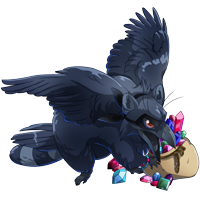

Unnamed
(#94712396)
Level 1 Veilspun
Click or tap to view this dragon in Predict Morphology.
Energy: 50/50

Expand the dragon details section.
Collapse the dragon details section.
Personal Style

Ancient dragons cannot wear apparel.
Skin
Scene

Measurements
Length
1.22 m
Wingspan
0.82 m
Weight
1.33 kg
Genetics
Orca
Starmap (Veilspun)
Starmap (Veilspun)
Eldritch
Constellation (Veilspun)
Constellation (Veilspun)
Smoke
Branches (Veilspun)
Branches (Veilspun)
Hatchday
Breed
Eye Type
Level 1 Veilspun
EXP: 0 / 245


STR
5
AGI
6
DEF
5
QCK
8
INT
8
VIT
5
MND
8
Biography
Sphinxmoth


https://en.wikipedia.org/wiki/Hades#
https://en.wikipedia.org/wiki/Serapis
https://en.wikipedia.org/wiki/Ascalaphus_(son_of_Acheron)
Aidoneus is derived from the Greek word “aidōn” which means “the unseen one” or “the invisible one.” This name emphasizes the god’s role as the ruler of the underworld, a place that is hidden from the mortal realm. On the other hand, Hades is the more commonly used name for the god of the underworld, derived from the Greek word “aïdes” which means “unseen” or “invisible.”
The origin of Hades’ name is uncertain, but has generally been seen as meaning “The Unseen One” since antiquity. An extensive section of Plato’s dialogue Cratylus is devoted to the etymology of the god’s name, in which Socrates is arguing for a folk etymology not from “unseen” but from “his knowledge (eidenai) of all noble things”. Modern linguists have proposed the Proto-Greek form *Awides (“unseen”). The earliest attested form is Aḯdēs (Ἀΐδης), which lacks the proposed digamma. West argues instead for an original meaning of “the one who presides over meeting up” from the universality of death.
In Homeric and Ionic Greek, he was known as Áïdēs. Other poetic variations of the name include Aïdōneús (Ἀϊδωνεύς) and the inflected forms Áïdos (Ἄϊδος, gen.), Áïdi (Ἄϊδι, dat.), and Áïda (Ἄϊδα, acc.), whose reconstructed nominative case *Áïs (*Ἄϊς) is, however, not attested.The name as it came to be known in classical times was Háidēs (Ἅιδης). Later the iota became silent, then a subscript marking (Άͅδης), and finally omitted entirely (Άδης).
Hades, Hierapolis
Perhaps from fear of pronouncing his name, around the 5th century BC, the Greeks started referring to Hades as Pluto (Πλούτων, Ploútōn), with a root meaning “wealthy”, considering that from the abode below (i.e., the soil) come riches (e.g., fertile crops, metals and so on).Plouton became the Roman god who both rules the underworld and distributed riches from below. This deity was a mixture of the Greek god Hades and the Eleusinian icon Ploutos, and from this he also received a priestess, which was not previously practiced in Greece. More elaborate names of the same genre were Ploutodótēs (Πλουτοδότης) or Ploutodotḗr (Πλουτοδοτήρ) meaning “giver of wealth”.
Epithets of Hades include Agesander (Ἀγήσανδρος) and Agesilaos (Ἀγεσίλαος),[12] both from ágō (ἄγω, “lead”, “carry” or “fetch”) and anḗr (ἀνήρ, “man”) or laos (λαός, “men” or “people”), describing Hades as the god who carries away all. Nicander uses the form Hegesilaus (Ἡγεσίλαος). He was also referred to as Zeus Katachthonios (Ζευς καταχθονιος), meaning “the Zeus of the Underworld”, by those avoiding his actual name, as he had complete control over the Underworld.
Hades was rarely seen outside his domain, but was allowed to have powers also on earth. Therefore people, who were still alive, were reluctant to swear an oath in his name, because they were so afraid of him coming for them as it was believed in those times that he could hear the voices calling his name. To some of them even calling his name 'Hades' was frightening. Hades was also known as a god of hidden wealth which referred to fertile soil as well as to the precious metals, such as sliver and gold. He was believed to have control over everything that was buried.
Depictions of Hades were rare. To ancient Greeks, he was a ghastly figure worth fearing. Not only did they not utter his name, but they did their best to avoid portraying him in art.
In the rare instances when artists braved the perceived taboo, Hades was usually shown as a bearded regal god. To reflect his nature, artists often portrayed him as solemn and mournful.
Sculptors frequently put Cerberus, the three-headed guardian dog of the Underworld, by his side. He often wore a helmet, too. It was known as the “Helm of Darkness” or the “Cap of Invisibility.”
Later works added a unique weapon presumable crafted by Hephaestus, a bident. It was similar to the three-pronged trident of Poseidon. However, it only featured two prongs.
Some scholars believe that it inspired the pitchfork shown in modern Christian depictions of the devil. Sometimes, the bident was a simple scepter.
As Plouton, this god had more flattering depictions. He usually held a cornucopia called the “Horn of Plenty.”
Hades had many symbols. They most often included items related to his myths. For example, the god had a connection to pomegranates, snakes, dogs, chariots, and more. However, symbols like white poplar and cypress trees also represented the god of the Underworld.
Click or tap a food type to individually feed this dragon only. The other dragons in your lair will not have their energy replenished.
Feed this dragon Insects.
Feed this dragon Meat.
Feed this dragon Seafood.
Feed this dragon Plants.
Exalting Unnamed to the service of the Lightweaver will remove them from your lair forever. They will leave behind a small sum of riches that they have accumulated. This action is irreversible.
Do you wish to continue?
- Names must be longer than 2 characters.
- Names must be no longer than 16 characters.
- Names can only contain letters.
- Names must be no longer than 16 characters.
- Names can only contain letters.










